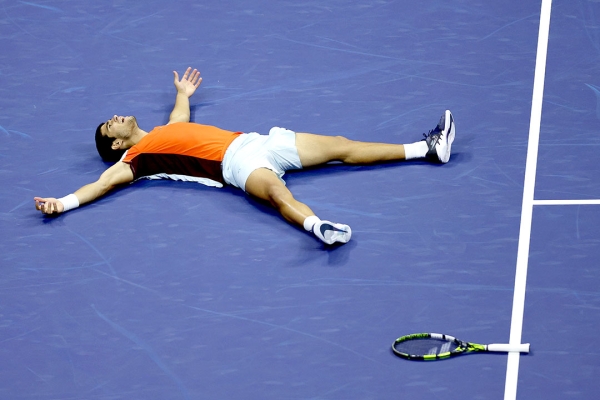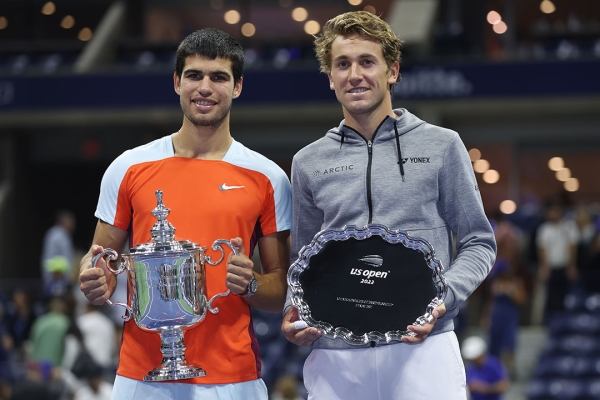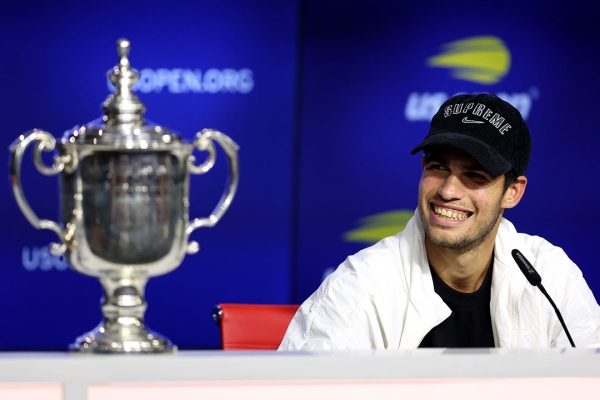Carlos Alcaraz completed his extraordinary rise to the top of the sport at just 19 years of age, becoming both a Grand Slam champion and world No.1 on Sunday after a high-stakes US Open final.
The Spanish teenager overcame Casper Ruud 6-4 2-6 7-6(1) 6-3 to achieve what many believed was his destiny – capturing one of the sport’s biggest titles and its coveted top ranking.
Those big titles could well flow more plentifully following his breakthrough in New York.
"It's crazy for me. I've never thought that I was going to achieve something like that at 19 years old. So everything is came so fast," said Alcaraz, now the youngest-ever men’s world No.1 in computer rankings history, plus the very first teenager to achieve the feat.
"For me it's unbelievable. It's something I dream since I was a kid, since I start playing tennis. Of course, lift this trophy today is amazing for me.
"I overcome myself a little bit. I played a great matches, high intensity, during the two weeks that I've never done before. I just can say that I'm really happy to move on to be No.1 of the world, still growing.
"I'm so, so happy."

Alcaraz has generated an enormous amount of hype this season, vaulting up the rankings to the summit after beginning 2022 outside the world’s top 30.
It is quite clearly justified, not only given the milestones he has notched, but the manner in which he has ticked them off.
After a nailbiting five-set loss to Matteo Berrettini in the third round of January’s Australian Open, Alcaraz won his very next tournament in Rio de Janeiro, the first of four titles he would win in a four-month purple patch.
Two of those were Masters 1000 crowns in Miami and Madrid – the latter at which he defeated Rafael Nadal and Novak Djokovic in back-to-back matches, the first time any player had ever done so on clay.
Between the Berrettini defeat and his eventual quarterfinal loss at Roland Garros, he won 30 of 32 matches, slashed his ranking from No.29 to No.6, and at one stage was unbeaten in 16 matches.
Exactly like women’s world No.1 Iga Swiatek, who was a similarly dominant force in the first half of 2022 before tapering off, he rebounded authoritatively at the US Open.
RELATED: Swiatek cements greatness with third major title at US Open
Happy to win my first US Open same year as you! Congrats Iga! ????
— Carlos Alcaraz (@carlosalcaraz) September 12, 2022
His playing style – aggressive, bold, well-rounded and guaranteed to produce highlights – has captivated fans the world over, especially here in New York.
It was at Flushing Meadows one year ago that he stormed into his first Grand Slam quarterfinal as a 55th-ranked 18-year-old, a first glimpse of the heights he was capable of scaling.
Returning 12 months later as the world No.4, he played even more thrillingly dramatic tennis, claiming three consecutive five-set triumphs – even saving match points against Jannik Sinner in the best contest of the tournament – to arrive in his first major final.
ALCARAZ DEFEATS SINNER: "Honestly I still don't know how I did it"
He has become a crowd favourite in New York and the majority of the 23,000-strong crowd were behind him on Sunday.
After the pair split sets, Ruud – appearing in his second major final this year and who would have become No.1 himself with victory over Alcaraz – came agonisingly close to winning the third, twice playing forehand winners to bring up set points in the 12th game.
Daringly, Alcaraz saved both by charging the net.
And when Ruud imploded in the subsequent tiebreak, it was instead Alcaraz with a two-sets-to-one lead.
There were to be no five-set heroics this time around, even though the teenager would end the fortnight having spent 23 hours and 40 minutes on court across seven matches – a Grand Slam record.
There were understandable nerves as he attempted to close out the match, but he simply served through them.
Two aces helped him arrive at championship point, which he converted with an unreturnable first serve to become the youngest US Open champion since Pete Sampras in 1990.
He is now 3-0 against Ruud, having also beaten the Norwegian in the Miami final.
ALCARAZ v RUUD: The highest of high-stakes US Open finals
READ MORE: Ruud, into US Open semis, closes in on No.1 ranking
"Before Miami, I was thinking that I have to still growing up. I thought that I'm able to do a good results in a Grand Slam, but not a champion," said Alcaraz, who becomes only the third player in the Open Era, after Stefan Edberg (US Open 1992) and Gustavo Kuerten (Roland Garros 1997) to win a major title after surviving three consecutive five-set matches.
"But I would say after Miami I won great matches in a row. I would say after that I thought that I'm able to win a Grand Slam.
"In Montreal and in Cincinnati I lost the joy a little bit. I felt the pressure. I couldn't smile on court which I'm doing in every match, every tournament.
"I came here just to enjoy, you know? To smile on court, to enjoy playing tennis. I love playing tennis, of course. I would say if I smile, if I have fun out there, I saw my best level, my best tennis."

Professional tennis confronts a period of significant transition.
The US Open was the site of Serena Williams’ compelling and emotional farewell, and was also notable for the absence of Roger Federer, who has not competed in more than a year and whose surgically-repaired knee is reportedly continuing to trouble him.
READ MORE: Always moving, forever evolving, Serena Williams steps beyond tennis
Rafael Nadal, 36, has also been sidelined regularly in the past 18 months as he battles myriad injuries.
With his extraordinary achievements and level of play, Alcaraz could perhaps step into the space inevitably to be vacated by these tennis titans.
And there are other encouraging signs the sport will remain in a healthy place, especially given Alcaraz and 23-year-old Ruud contested the second-youngest men’s US Open final of the Open Era, and are now the world No.1 and No.2 players.
His ultimate victory has left Alcaraz motivated for ongoing success.

"Right now I'm enjoying the moment. I'm enjoying have the trophy in my hands," Alcaraz said.
"But, of course, I'm hungry for more. I want to be in the top for many, many weeks. Hope many years. I'm going to work hard again after this week, this amazing two weeks.
"I'm going to fight for have more of this (smiling)."